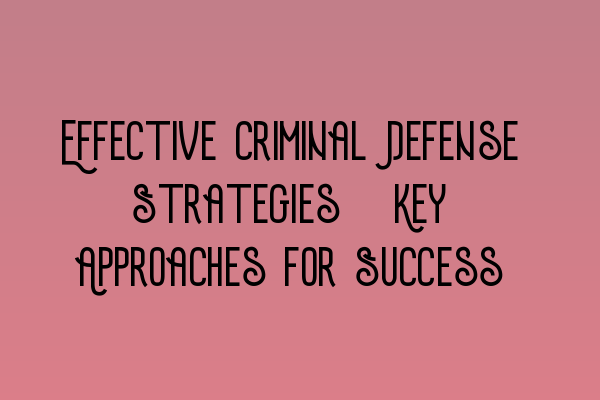Effective Criminal Defense Strategies: Key Approaches for Success
Introduction
When facing criminal charges, it is crucial to have a strong defense strategy in place. The outcome of a criminal case can have serious consequences, affecting your freedom, reputation, and future prospects. In this article, we will discuss key approaches to developing effective criminal defense strategies that can help ensure a successful outcome.
To best prepare for your criminal defense, it is important to understand the SQE (Solicitors Qualifying Examination) process. Since successfully passing the SQE1 and SQE2 exams are prerequisites to practicing as a solicitor in the UK, it is essential to consider appropriate preparation courses. SQE 1 Preparation Courses can provide you with the necessary knowledge and skills to excel in the exams. Additionally, SQE 2 Preparation Courses are available to further enhance your understanding of criminal law.
Understanding the Case
The first step in building an effective defense strategy is to thoroughly understand the details of the case. This involves gathering all relevant information, such as police reports, witness statements, and any available evidence. By closely examining the facts, a defense attorney can identify strengths and weaknesses in the prosecution’s case.
In order to succeed in the SQE exams, it is important to practice answering hypothetical criminal law questions. Take advantage of SQE 1 Practice Exam Questions and SQE 1 Practice Mocks (FLK1 & FLK2) to sharpen your legal analytical skills and simulate real exam scenarios.
Building a Strong Defense
Once the case is fully understood, it is crucial to develop a strong defense strategy. This involves assessing the available legal arguments and identifying potential defenses that can be used to challenge the prosecution’s case. Common defense strategies include lack of evidence, self-defense, mistaken identity, and alibi.
To effectively prepare for the SQE exams, it is essential to stay up-to-date with relevant legislation, case law, and legal principles. Consistently reviewing SQE 1 and SQE 2 preparation materials will help ensure a solid understanding of criminal law and procedure.
Effective Negotiation and Advocacy
Depending on the circumstances, negotiation with the prosecution might be a viable option. Skilled negotiation can lead to reduced charges or even a plea bargain. A criminal defense attorney must possess excellent communication and persuasion skills to advocate for their client’s best interests.
It is crucial to stay informed about upcoming SRA (Solicitors Regulation Authority) SQE exam dates to plan your preparation accordingly. Familiarize yourself with SRA SQE Exam Dates to ensure you are well-prepared and avoid any last-minute surprises.
Conclusion
Developing an effective criminal defense strategy requires a combination of legal knowledge, critical thinking, and effective communication skills. By thoroughly understanding the case, building a strong defense, and utilizing negotiation and advocacy techniques, you can achieve the best possible outcome.
Remember, success in the criminal defense field requires continuous learning and preparation. Stay dedicated to enhancing your legal knowledge and skills by taking advantage of resources such as SQE 1 and SQE 2 preparation courses, practice exams, and mock tests.
If you are seeking to excel in the SQE exams or require professional legal representation for your criminal case, SQE Criminal Law & Practice Law UK is here to support you every step of the way.
